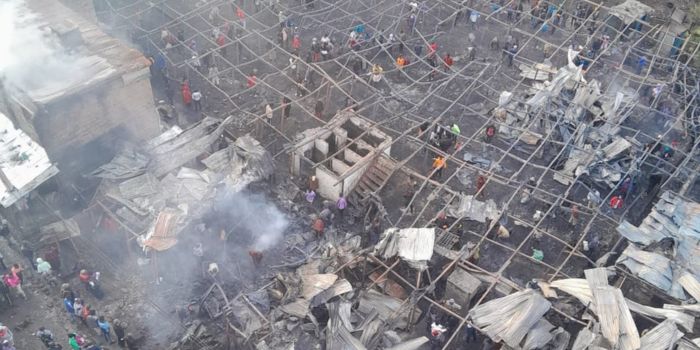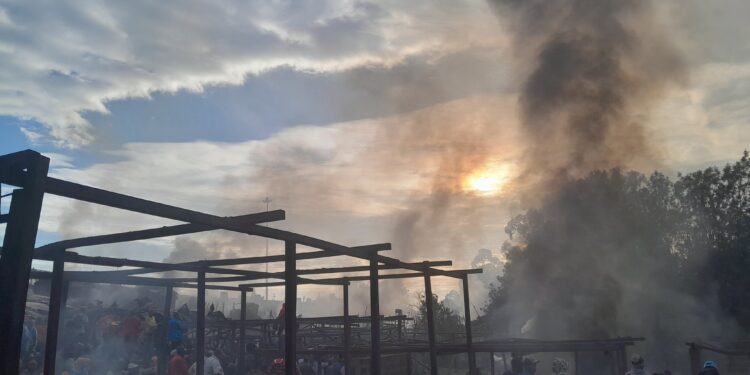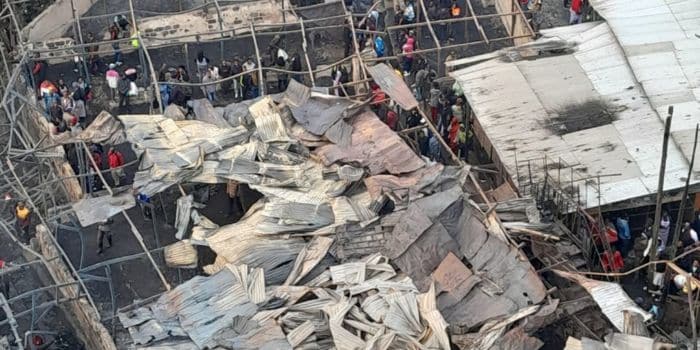On Friday December 1, 2023, Kenyans woke up to the news of yet another fire in Gikomba market.
Being the biggest open-air market in East Africa, one would assume that this would be newsworthy, but it isn’t anymore.
According to an article by Martin Siele published on the Business Today dated December19, 2021, at least 15 fires have been reported in Gikomba market in the past six (6) years alone.
The worst of these fires occurred between October and November 2021 where at least three (3) fires were reported namely on October 19th, November 8th and 26th respectively.

And whereas successive governments always promise to get to the bottom of the cause of fires, nothing ever seems to be done.
The true cause of the fires has never been established with a wide range of theories as to possible triggers being floated depending on whom you ask.
Also Read: Another Mysterious Fire Burns Down Gikomba Market
From suspected arson attacks from powerful and well-connected individuals with intentions of grabbing the land, to traders settling business scores, electric faults or the eviction of tenants occupying county houses, the list is endless and only keeps growing.
According to then Nairobi Senator Johnson Sakaja who was quoted in 2021 speaking his mind on the subject, “some of these traders burn the place in order to be compensated by the insurance after they cannot restock.”
If this is true, then the same is quite alarming since the insurance claims are ever increasing and so are the premiums.
How insurance could be the mysterious cause of Gikomba fires
According to Ben Kajwang in his paper titled Contribution of Fire Insurance to The Growth of Businesses in Kenya, loss of business due to fire can be financially debilitating. This damage can be difficult to recover from and the business owner may face a financial crisis.
Nevertheless, a cushion-like fire insurance can help can increase the ability of business owners to rebuild their businesses after experiencing fire damage.
Whereas this importance is often understated, the lack of which can have disastrous economic as well as other losses upon the victims.
Indeed, Gikomba is a market that has churned out millionaires.
With the hundreds of thousands of traders dealing with all manner of goods to the various service providers giving essential services to the customers purchasing goods, there is something for everyone.
These returns are often invested in table banking groups popularly known as “chamas” while the deposits form attractive security for access to credit.
This got me thinking, could it perhaps be true that these traders perpetuate the moral hazard dilemma?
Possibility of Moral Hazard in Gikomba explained
A moral hazard is a situation where an insured individual, knowing that he is insured, will act in a reckless or careless manner intentionally.
It is a situation where the insured takes advantage of the insurance company to make a profit of sorts.
According to the Association of Kenya Insurance Report 2019 on fire insurance performance, fire insurance is made up of fire Domestic and Fire Industrial insurance.
Fire insurance gross written premiums (GWP) was KES 13.07 billion in 2019 compared to KES 12.90 billion in 2018, a 1.25% increase.
Also Read: Kamukunji MP Wants Gikomba Market Declared Disaster Area
Fire Industrial GWP was KES 11.39 billion (87%) and Fire Domestic was KES 1.67 billion (13%). Total net earned premium was KES 3.82 billion, net claims incurred KES 1.67 billion, total expenses amounted to KES 1.98 billion while underwriting profit was KES 666.18 million.
Industrial fire insurance took the cake of covers at 87% while domestic insurance stood at 13%.
Need for a conversation
These statistics underscore the increased appetite for the uptake of this covers while further underscoring the need to establishing and mitigating the risks underlying that perpetuate the increase in cost of insurance to deserving businesses due to its prohibitive costs.
Overall, whether or not this shall happen is a question of ‘IF’ rather than when, but perhaps this conversation can begin in earnest.
And with an economically challenging year characterized by a weakening shilling, increased taxation capital flight due to investors migration and the influx of cheap goods from China, it is easy to see how tempting the prospect of an insurance payday would be to these traders.
I mean who wouldn’t want some money during these times?
Until that happens, Kenyans and especially those who earn a living from the sprawling market shall only wait until the next fire to count their losses yet again.











































































